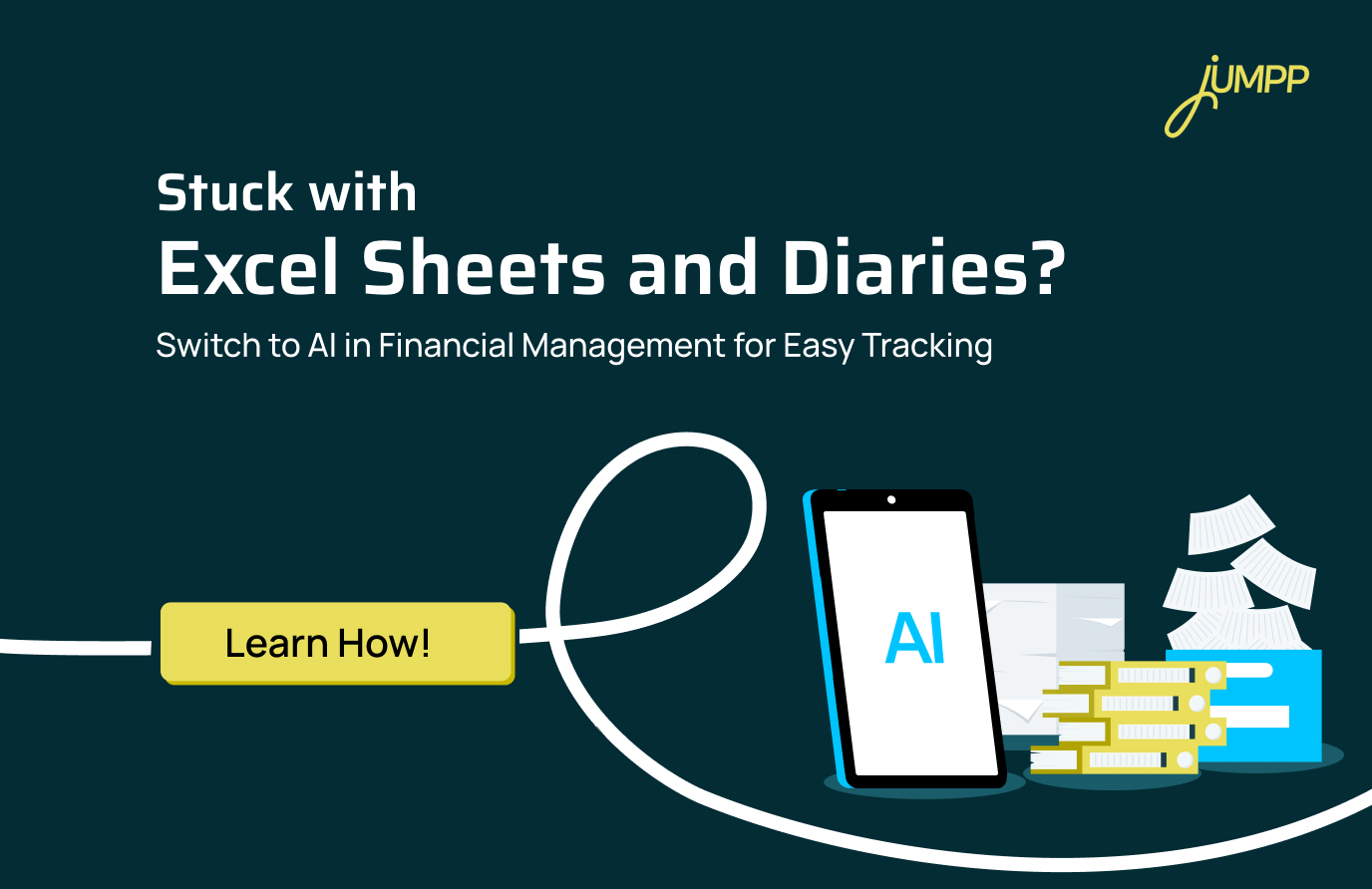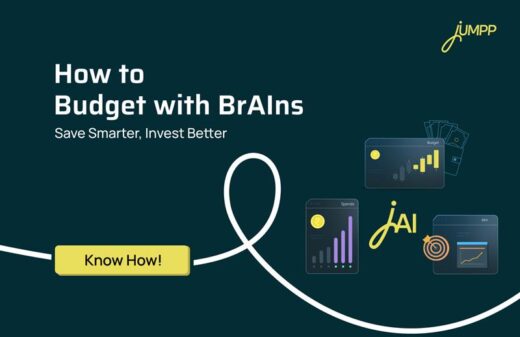Manual Budgeting is Outdated – AI in Financial Management is In!

Why AI in Financial Management is the Next Big Thing?
With the rise of digitisation, irresistible discount deals, and tempting savings offers, it’s easy to get carried away and buy more than we need. This is a reality for most of us. What happens next? We spend, forget, and then wonder where all our money went! It’s amusing yet relatable—no matter how much we try to save, we’re never quite sure if we’re doing enough or simply overspending. Traditional budgeting methods, like jotting down expenses in a diary, are time-consuming and, frankly, boring. But with AI in financial management, now is the perfect time to explore how AI-powered tools can help us track our spending
Its time to take a smart leap forward in managing our personal expenses!
AI in Financial Management: Track, Budget, and Invest Better with Smart Technology
Artificial Intelligence (AI) in financial management means using smart technology to help manage money and do so much more! It involves systems that can learn from data and make predictions or suggestions without our intervention.
Now, open a zero-balance savings account and dash towards your financial goals with your personal AI-powered assistance- jAI
AI tools for personal finance work by analysing large amounts of data to help you make better financial decisions. For example, AI can help you budget your money, track your monthly spending on food, movies, and fuel, suggest smart ways to save from the areas where you are overspending, and even recommend the best investment options based on your goals. These AI tools for personal finance use machine learning and algorithms to understand your financial habits and give you personalised advice.
AI in financial management automates tasks that once took hours of work. Instead of manually tracking every expense or investment, AI tools do it automatically, saving you time and helping you make smarter financial decisions!
AI vs Traditional Financial Management Tools: A Shift in Personal Finance
How financial management was done in India?
Do you remember the days when your grandfather carefully maintained a register to track monthly expenses and record the daily budget for the household or family business? Those were the times when managing finances meant huge paperwork, bulky calculators, or spending countless hours on those registers. Today, with the rise of Artificial Intelligence (AI) and smart tools, managing finances has become easy and fun.
But, what were the limitations of traditional methods that have led us use better solutions?
Let us see!
The Traditional Approach to Financial Management in India
For decades, we Indians have relied on traditional tools like pen and paper. While some of these methods can be effective, they often come with limitations:
1. Manual tracking of daily expenses, bills, and savings is a time-consuming task. For example, if you’re manually logging every expense, a minor mistake can affect your overall calculations.
2. Traditional methods cannot offer in-depth analysis.
3. To make the right decision, you may need to go through numerous articles, reports, and financial statements. This requires time and effort, and it’s easy to overlook important trends or data points.
While these methods are familiar and still widely used in India, they are not perfect. Now, let’s explore how AI tools for personal finance are here to do wonders!
AI in Financial Management
AI tools for personal finance help to automate, optimise, and simplify financial management.
Let us take a look at a few AI in finance management examples:
Automating Time-Consuming Tasks
AI-driven apps are gaining popularity in India for their ability to automatically track and categorize your spending. AI tools analyse your bank transactions and categorise your spending in real time.
Suppose you’re spending too much on dining out. The AI tool might suggest cutting down your restaurant bills by 20% next month, which helps you save more.
This proactive advice is something traditional methods can’t offer.
Smarter Investment Management
AI tools for personal finance can guide you to effectively manage your investments.
AI is transforming quantitative trading by analysing large datasets, identifying patterns, and executing trades precisely. Machine learning algorithms process historical and real-time market data to optimise investment strategies and reduce risks. Unlike traditional methods, AI can react instantly to market fluctuations. This makes high-frequency trading more efficient. With AI-driven insights, investors can make data-backed decisions and improve portfolio performance.
Let’s say you’ve invested in mutual funds, but you’re not sure if you should continue or switch to something else. AI-powered apps could suggest daily market ups and downs with some solid market predictions.
Efficient Loan Processing
AI is revolutionizing banking by automating tasks. Banks are investing in AI to streamline loan approvals, personalize financial advice, and optimize risk management. With AI’s expansion, the industry is witnessing faster transactions, better security, and more efficient operations.
AI makes loan approval processes faster and more accurate by analysing credit scores and transaction history. This helps banks and lending institutions quickly assess the creditworthiness of individuals and disburse loans efficiently.
Fraud Detection and Prevention
AI systems can detect unusual patterns in transactions, which is crucial for preventing fraud in online banking and credit card transactions. For instance, AI can flag a suspicious transaction if it doesn’t match your typical spending behaviour.
However, AI in cybersecurity is a double-edged sword. While AI-powered security systems enhance fraud detection by identifying anomalies in real-time, cybercriminals are also using AI to launch sophisticated attacks. AI-generated phishing scams, deepfake financial frauds, and automated cyberattacks pose new risks. This makes AI a crucial player in financial cybersecurity, working as both a defender against fraud and a vulnerability that hackers can exploit.
Customer Service Innovation
Many banks and financial institutions in India now use AI-powered chatbots to provide 24/7 customer support. These chatbots can answer queries, assist with transactions, and offer personalised financial advice.
AI in Financial Management: How Smart Tools Outperform Traditional Methods
Let’s compare AI and traditional tools for financial management:
| Feature | AI Tools | Traditional Tools |
| Expense Tracking | Automatically tracks daily expenses (e.g., food, transportation) through apps | Manual entry of each expense in a notebook or Excel sheet. |
| Budgeting | AI suggests a budget based on your spending patterns | You have to manually set a budget and track progress weekly or monthly. |
| Investment Recommendations | AI analyses your financial goals and recommends investment options | You research investment options and make decisions on your own. |
| Time Required | Minimal time: AI works automatically in the background. | Requires hours of manual tracking and updates. |
| Personalisation | AI gives personalised advice | No personalisation; you create your strategies. |
| Learning Ability | AI learns from your financial behaviour and improves recommendations over time. | Does not adapt or learn; requires manual changes. |
Why AI is the Future of Personal Finance
When it comes to managing your finances, AI and traditional tools each have their strengths.
- AI in financial services provides data-driven insights for smarter financial planning.
- Finance AI chatbots automate customer service.
- The recent use of artificial intelligence in finance research papers highlights how AI can analyse large datasets.
- Finance AI tools, such as automated expense trackers and budgeting apps, streamline personal finance management.
- The benefits of AI in finance include improved efficiency, reduced errors, and better forecasting for businesses and individuals.
- The importance of AI in financial management lies in its ability to analyse vast amounts of data quickly.
Traditional tools like spreadsheets and manual calculations can be slow and error-prone. While traditional tools require constant updates and hands-on effort, AI adapts to changes automatically. In the battle of speed, accuracy, and convenience, AI clearly takes the lead!
In India, where millions of people are becoming more financially literate and investing for the first time, AI-powered financial management tools offer a unique advantage. These tools make personal finance accessible to everyone!
Challenges and Risks of AI in Finance
AI is changing finance, but it comes with risks. One big worry is data privacy—AI needs a lot of personal and financial data, which must be kept safe. Changing rules and regulations also make things a little complicated. Plus, AI predictions are not always correct, which can lead to losses. That’s why using AI responsibly is so important!
Why not take the leap and see how jAI, a reliable AI-powered platform, can address these challenges today?
jAI: AI Tool For Personal Finance
Driven by cognitive and predictive AI, jAI simplifies your finances. It’s not just about budgeting—it’s about smarter spending, better saving, and more insightful investing.
1. By analysing your spending habits, jAI offers personalised budgeting suggestions
2. Have no idea where your money’s going? Just ask jAI! Link your accounts and watch as jAI uses its power to help you!
Start Your jAI Journey Today
Open your free savings account and let jAI handle the rest.
Let’s jump into smarter finance management and make your financial future brighter with jAI!
AI in Financial Management: FAQs
AI automates tasks like budgeting, tracking expenses, and making investment decisions by analyzing financial data.
AI in banking helps with fraud detection, personalized customer service (via chatbots), automated loan approvals(still in experimentation phase), transaction automation, and offering financial advice.
Yes, AI is revolutionizing finance by improving efficiency, reducing human error, and offering smarter financial management tools. As its use grows, we can expect even more advancements in the financial world.
Some of the best AI for finance include robo-advisors, AI-driven budgeting apps, and AI tools used for fraud detection and investment analysis.
AI will assist humans in finance but won’t completely replace them, as human judgment is still essential for decision-making and strategy.
In 2025, AI in finance will be more advanced, focusing on improving automation, real-time data analysis, and fraud detection systems.






